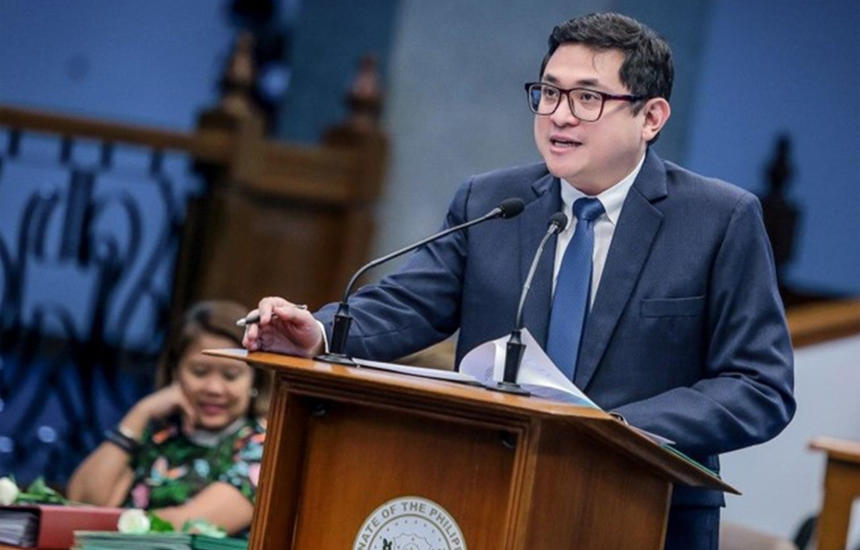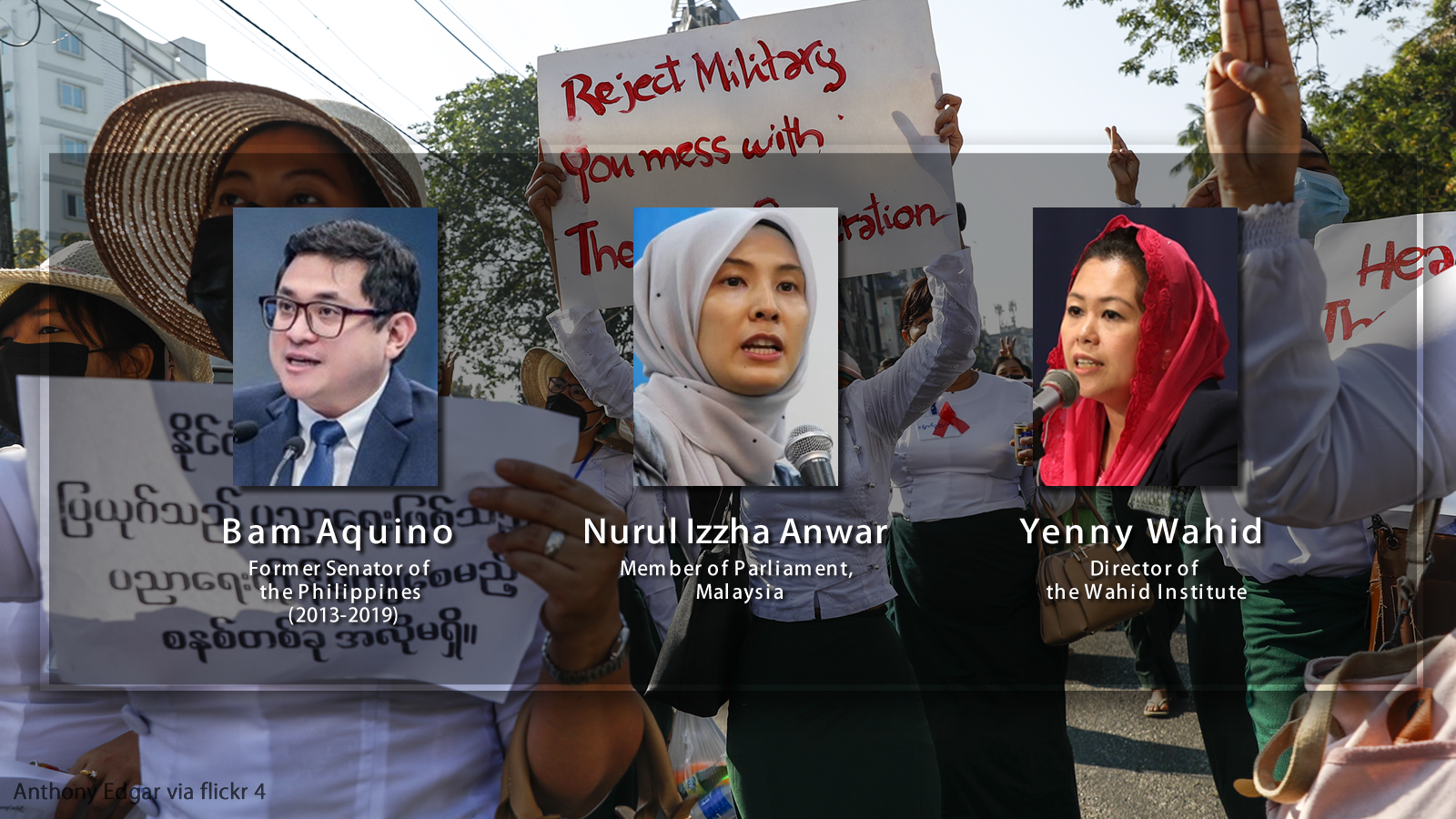Filipinos look for leaders who are effective and can improve their lives immediately
 Bam Aquino, Former Senator of the Philippines (2013-2019)
Bam Aquino, Former Senator of the Philippines (2013-2019)
The following transcript is from an interview conducted by Genron NPO President Yasushi Kudo with Bam Aquino, Former Senator of the Philippines. Content has been edited and re-arranged for length and clarity. Kudo began the interview by asking Aquino his opinion on the current state of democracy in the world.
Not a choice between democracy and authoritarianism
The public just wants governance and government that get results
"I'm still optimistic about democracy, especially here in the Philippines," Aquino began. "When we talk about democracy in the Philippines, I think Filipino people still want to see the elections; they expect that the elections are going to happen next year. The challenges are in the aspects of democracy...in terms of the pillars of rule of law, human rights, free press. All of these have been challenged in the last couple of years. I think at the end of the day, the Filipino people still want the power to vote for their leaders."
Kudo narrowed the focus of the discussion when he noted the number of recent coup d'états and newly resurrected military governments in Asia. He also pointed to the decreasing number of democratic countries in the region, and asked Aquino how he feels about the future of democracy in Asia.
"I think more and more citizens are looking for effective governance," Aquino said. "Not just in Asia...but around the world. In the past, democratic countries may not have been able to deliver on promises of development, of social services, of equitable distribution of resources to the population. So, many individuals started to look for more effective types of governance."
"In the Philippines, a lot of our countrymen were looking for inclusive growth," Aquino continued. "During the times our economy was growing, that growth could have been more inclusive and could have reached more areas in the Philippines - not just concentrated growth in the cities or in specific sectors, or industries, or even families. They were looking for growth that was felt by a majority of Filipinos. Unfortunately, the heavily-democratic leaning administrations in the past were not able to fulfil this promise. I think it is the same around the world. With rising inequality, a lot of citizens have started to question whether democracy could really fulfil those promises. The problem is the myth that purports that only an authoritarian government can provide effective governance. We know that's largely propaganda, but a lot of people believed it. A lot of people were willing to let go of some democratic ideals... for the chance of more effective governance. I think for those of us that espouse the democratic system and all the ideals of democracy, it's really a challenge to show that an administration that relies heavily on the democratic ideas of rule of law, free press, and human rights can be effective as well."
"It's also a wake-up call," Aquino warned. "Leaders should understand that citizens aren't enamored with...governing systems or styles. They want to see outcomes. They want to see their lives becoming easier with the governments that they are under. I think we have to break that myth: that decisiveness and effectives only can be done under a non-democratic system. Because now we know it's not true. But we also have to show that a leader that leans heavily on democratic ideals can also be decisive, can be effective, can actually mean real progress and real development at the grass-roots level. For groups that have leaned heavily on the democratic side, they have to balance out the short-term, the medium-term, and the long-term goals they have for the country, and they also have to be effective."
Democracy mustn't be taken for granted; protecting it is a constant battle
"We also have to be honest, and look at ourselves and try to see issues and concerns of the citizens," he stressed. "You can't just sweep it under the rug and call it 'populist.' You have to address why these issues are important to your citizens, and you have to balance it out while still relying on human rights, rule of law, a free press."
Aquino explained that because the Philippines has been a democracy for a long time, its people may have thought that the system would correct itself, and that it couldn't be manipulated. That, however, was a mistake.
"Democracy is something you have to fight for consistently. You can't take it granted, and I think in the Philippines we took it for granted. If you want to keep your state a democracy, it's something you have to continually work towards, fight for, and build on. You can't just expect it to work on its own."
According to Aquino, democracy is not solely about holding elections.
"We think that as long as people are able to elect their leaders, they are in a democracy. It's much more than that. It's also a mindset where government, rather than leaning on just one person, leans on the citizens. That's something that cannot just be activated every three years or every six years. It has to be supported even when there are no elections coming up. If we're able to build it into all of our systems, and work towards supporting and strengthening (our) democracy, it won't be as easily challenged."
Public seeking results in the short-term, not mid-to-long-term
Quick responses and careful communication needed
Kudo agreed that it is necessary to destroy the myths surrounding the supposed effectiveness of governance under authoritarian regimes. He also admitted that he doesn't understand why people put so much trust in such regimes when authoritarians do not necessarily govern more effectively, and asked Aquino if he could explain.
"The runway for development that a lot of democratic systems chose to look at was too long...maybe ten, fifteen, twenty years," Aquino suggested. "But people now want more immediate results, so leaders have to balance it out. They can't just say, 'Everything I'm doing is for your children.' Yes, still do that, but try to look at where people are now. For example, in our last presidential election, traffic was a big issue, and the issue of traffic is very immediate. I think in the next presidential election, jobs will be the big issue...not for the future, but right now. It's a misstep for democratic leaders to forego the immediate concerns that many of their countrymen have. And if they do address it, they aren't equipped enough to communicate as well as certain authoritative leaders. The myth took over because the ingredients were there. It wasn't out of the blue. First, democratic-leaning leaders need to focus on immediate concerns as much as they are focusing on long-term concerns. And second, they should be able to communicate better."
Aquino elaborated about how he feels democratic leaders can learn from their opponents about how to improve their communication.
"The messaging style of authoritarian leaders works better on social media than democratic-leaning leaders. Social media is about anger and outrage and a lot of heightened emotions. Because of the way social media runs, and because of what the algorithms reward in terms of variety and reach, there is a perfect combination between the authoritarian, bombastic, controversial leaders and how social media has become such a big part of our world. That's a communication challenge that democratic-leaning leaders need to figure out so that they can match up."
Later in the interview Kudo returned to the concept of social media and how it can be harnessed. Aquino responded that in order to send effective messages, they need to harness the people.
"The key is that the democratic leaders (who have used social media successfully) lean on the people, on their supporters," Aquino said. "Whether they are major influencers or artists or even minor influencers like community leaders, and they are able to get them to be very, very vocal."
Restoration of democracy must come from within
Kudo mentioned how US President Joe Biden is advocating for the restoration of democracy around the world, and asked Aquino what his expectations are regarding that effort.
"America is such a huge player in the world, and they do affect our policies in the Philippines and in Japan, but I've always said that correction cannot come from an external impetus," Aquino argued. "The corrections towards more 'democratic' ideas need to start from within...and people need to realize it on their own. And the way that they express that should be through the electoral process, not through Facebook or Twitter. I hope that whoever we choose next year will make an effort to bring people together. I'm hoping that we can have a ... leader emerge in 2022 who really makes the effort to bring people together, listen to everybody from all the parts of the Philippines because we have thousands of islands. And in that process, try to lean on the democratic ideals of trying to bring people together while at the same time being decisive, being effective, and being a strong leader."

Post a comment